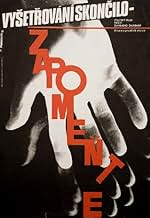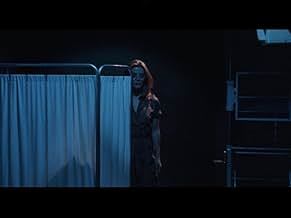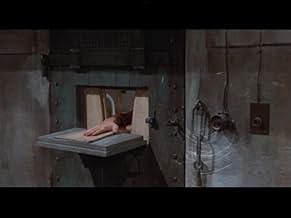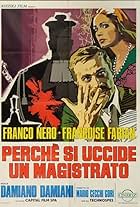IMDb RATING
7.2/10
777
YOUR RATING
An architect jailed for a traffic violation discovers the grim reality of life behind bars, including corrupt staff and inmates, an inhuman judicial system, and the power of the Mafia.An architect jailed for a traffic violation discovers the grim reality of life behind bars, including corrupt staff and inmates, an inhuman judicial system, and the power of the Mafia.An architect jailed for a traffic violation discovers the grim reality of life behind bars, including corrupt staff and inmates, an inhuman judicial system, and the power of the Mafia.
Georges Wilson
- Campoloni
- (as George Wilson)
Gianpiero Bettega
- Prisoner
- (as Giampaolo Bettega)
Ricciardetto Desimone
- Ricciardetto Simonetti
- (as Ricciardetto de Simone)
Storyline
Did you know
- TriviaItalian censorship visa # 59118 delivered on 13 October 1971.
- ConnectionsFeatured in Goodbye & Amen (1977)
- SoundtracksMarch of the Toreadors
Written by Georges Bizet
Featured review
Another atypical Eurocrime film from Damiano Damiani, most of which takes place in a men's prison. It's low on action but fascinating nonetheless. It'll also keep you on the straight and narrow as you will not want to go through what Franco Nero does here.
You see, Nero has been accused of a hit and run and even before his trial gets thrown into a prison full of hardened criminals. Nero is an architect and his reputation as a snobby rich kid precedes him, although that money does help soften the blow a little as he pays the guards to bring him decent food and even gets a hooker brought in by the crooked doctor. What it doesn't do is make him popular among his cellmates, one of which is psychotic lifer John Steiner, who constantly provokes Nero, mostly by farting every time Nero speaks!
So with Steiner and his friends eating Nero's food parcels and pissing on his bed, Nero does make a couple of friends, one being a dying old man who tries to educate him in the ways of being in stir, the other being a Mafia Don taking the rap for some high ranking Capos who is also pulling the strings of the head prison guard by way of 'favours' regarding his son's career.
During a prison riot, Nero witnesses the beating of a prisoner trying to sneak out a note given to him by another prisoner and suddenly finds himself transferred to the cell containing the very paranoid note-writer. The note-writer is adamant that Nero has been sent to kill him, and Nero finds himself a pawn in some deadly game involving the Mafia and corruption, while his friends on the outside refuse to see the severity of his situation.
I'm not familiar with the actor Riccardo Cucciolla, but he does a great job here as the guy standing up to the whole corrupt society. He's the key in bringing down a corrupt business enterprise and even though his lawyer is on the Mafia's side, his stubbornness and sense of moral duty is unshaken throughout the film, whereas Nero, who can see right from wrong, struggles against the constant psychological torture.
Director Damiani raises a lot of questions here about what we are willing to do to survive and I think the ending was quite fitting. You'll be asking yourself what you would do in such a situation, right up to the very last scene in the film. A grim, morally ambiguous film that deserves adjectives like 'riveting', 'gripping' and 'mesmerizing' in the hands of a better reviewer, whereas I'm just going to point out that for a prison film no one got bum raped.
You see, Nero has been accused of a hit and run and even before his trial gets thrown into a prison full of hardened criminals. Nero is an architect and his reputation as a snobby rich kid precedes him, although that money does help soften the blow a little as he pays the guards to bring him decent food and even gets a hooker brought in by the crooked doctor. What it doesn't do is make him popular among his cellmates, one of which is psychotic lifer John Steiner, who constantly provokes Nero, mostly by farting every time Nero speaks!
So with Steiner and his friends eating Nero's food parcels and pissing on his bed, Nero does make a couple of friends, one being a dying old man who tries to educate him in the ways of being in stir, the other being a Mafia Don taking the rap for some high ranking Capos who is also pulling the strings of the head prison guard by way of 'favours' regarding his son's career.
During a prison riot, Nero witnesses the beating of a prisoner trying to sneak out a note given to him by another prisoner and suddenly finds himself transferred to the cell containing the very paranoid note-writer. The note-writer is adamant that Nero has been sent to kill him, and Nero finds himself a pawn in some deadly game involving the Mafia and corruption, while his friends on the outside refuse to see the severity of his situation.
I'm not familiar with the actor Riccardo Cucciolla, but he does a great job here as the guy standing up to the whole corrupt society. He's the key in bringing down a corrupt business enterprise and even though his lawyer is on the Mafia's side, his stubbornness and sense of moral duty is unshaken throughout the film, whereas Nero, who can see right from wrong, struggles against the constant psychological torture.
Director Damiani raises a lot of questions here about what we are willing to do to survive and I think the ending was quite fitting. You'll be asking yourself what you would do in such a situation, right up to the very last scene in the film. A grim, morally ambiguous film that deserves adjectives like 'riveting', 'gripping' and 'mesmerizing' in the hands of a better reviewer, whereas I'm just going to point out that for a prison film no one got bum raped.
- How long is The Case Is Closed, Forget It?Powered by Alexa
Details
- Release date
- Countries of origin
- Language
- Also known as
- Istragata e zavrsena: zaboravi
- Filming locations
- Production company
- See more company credits at IMDbPro
Contribute to this page
Suggest an edit or add missing content

Top Gap
By what name was The Case Is Closed, Forget It (1971) officially released in Canada in English?
Answer



























